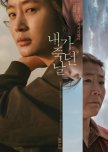
Atypical, yet worthwhile thriller, driven by a unique variety & sensitive quality of women´s power
"The Day I Died: Unclosed Case" is a thriller. However, the KMovie takes its time. It is atmospherically embedded in the slowed down everyday life on an island. The focus is on emotionally approaching the protagonists. In this case, the key characters are all women, who are surrounded by other women. Men are only indirectly involved in the background of the story - among other things as those who stand for the painful wounds in the women's lifes.So you might think: a movie about women's power? As a matter of fact, that's true. However the actual power of women is not men´s power in women's clothes. In this movie, women´s power symbolizes in an idiosyncratic way how the usually devalued "weak" in the 'female' becomes "powerful" and effectively plays out its transforming and liberating quality, yet in a rather calm, descreet variety: silent, subtle, empathetic, unobtrusive.
The story is quite exciting, profound and complex. In the course of the investigation, the detective - strong, competent and at the same time hurt and vulnerable - is increasingly confronted with open questions in her own life. She slowly builds an emotional connection with the missing victim. Although the case seems clear and simple to everyone else, she cannot let it go. She is driven to shed light on injustice of some sort. Is she fighting for the missing victim? Is she fighting for herself? Either way, she finds the answers she's looking for.
In a touching way the strong presence of the two veterans Kim Hye-soo and Lee Jung-eun rounds an exciting story off. Script and direction are also in women's hands here. "The Day I Died: Unclosed Case" is not a classic crime thriller, but definitely worth seeing - with a unique variety and sensitive quality of women´s power.
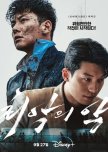
Brutal, merciless milieu of gangs & drug cartels. Stirring, gloomy but with soulful strings, too
What a positive surprise. For all those who are not afraid of the brutal, merciless milieu of gang wars and drug cartels: "Worst of Evil" offers intense characters with dynamic profiles, especially of the two protagonists - the rural police officer who joins a new Gangnam gang as an undercover agent, to help uncover the organized drug trade between China, South Korea and Japan, as well as the boss of that Gangnam gang.In particular, Ji Chang-wook as Park Jun-mo alias Kwon Seung-ho puts his heart and soul as well as quite some muscles and fighting into it. Whatsoever, he is impressive. But so are the others. It´s well cast and Disney+ apparently didn't skimp on anything...
For me personally, gang stories like this one aren't really my first choice. Too much crude violence, too much highly concentrated testosterone... "Worst of Evil" is no exception. Sharp blades and baseball bats are in high demand, especially in the first half. Nicotine seemingly acts as nutrition and even the fanciest suits can't hide the fact that a lot of blood is being shed unscrupulously...
Nonetheless.
“Worst of Evil” features complex characters and highly explosive relationship dynamics that is touching, gripping and, more importantly, provides emotional substance, too.
Eventually, undercover operations are psychologically demanding. The boundaries between true and false identity are blurring. A solid compass for right and wrong can easily be lost. The reality of living the undercover life creates new truths in which even the 'false' identity becomes a ´true´ part of one's own life. Coming to terms with this obviously is not easy. The return to the old life as it was before, even less so. In the case of "Worst of Evil", these internal and external conflicts of our undercover investigator become even more difficult by the fact that his wife has a history with the gang boss that he knew nothing about. She, his wife, herself a police officer and officially not ´his´ wife in terms of the new undercover identity, is now drawn into current affairs in a way that the small special investigation team could not have foreseen.
Not to mention the fact that the drug cartels involves powerful partners, not only in South Korea, but also in China and Japan. At last, the homicide police also get involved in dealing with everyday gang activities and murder cases in Gangnam. None of those involved is squeamish whatsoever. So danger lingers everywhere. Not only fists and fights, but also intelligent, diplomatic solutions are required. High-end improvisation is on the agenda for our hero.
"Worst of Evil" is thrilling, stirring, gloomy and – despite all the blood that boils over and over again (and all the copious amounts that are spilled) – it has its soulful strings, too. It's about trust, loyalty, bromance, the relativity of 'right' and 'wrong', and ultimately the ethical question of which end justifies which means...
Is the story predictable? Well, I can't fully deny that. But in "Worst of Evil" the journey is clearly the destination - what the undercover special operation DOES with this once "mother-in-law's favorite" and how he comes to terms with it. In addition, his counterpart, the self-proclaimed, brash, brilliant gang leader, is also quite interesting. With his vita, his goals and desires, he doesn't really fit into the usual cliché and thus brings additional dynamism. In addition, several other characters in the cartel (and police) environment impress with strong profiles, too.
As I said, I was pleasantly surprised. "Worst of Evil" had me. It's pretty well made all around and has actually more to offer than just ruthless gangs and action. (Nevertheless, be prepared, it still is about the milieu of ruthless gangs...)
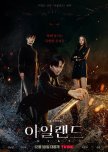
Mythical worlds, demonic realms & human tragedy mixed with luminous impulses + even humorous tones
'Island' is a KDrama released on streaming platform TVing.Alas! The unspeakable bad habit à la Netflix is obviously spreading rapidly: break series into half and then wait a couple of months before the story continues. Really? It's frustrating. Not just for me, obviously. And not for the first time. Same here. KDrama has always been doing great with solidly telling a story in one season, how long it may take... (In that sense, going global turns out to be an unnecessary step backwards.)
I would also like to mention in advance, I was a bit disappointed. Something was missing. A spark of whatsoever. Maybe another streaming-platform-malady: a compact binge-worthy story is often (I think) paying the price by losing some of its intensity. The story doesn't grab me that much, I rather watch. So there's a loss of potential there (I think).
Still it is entertaining to watch and has its moments.
In "Island" time and space become relative in many respects. What the still remembered past is for some, a past, long-forgotten life it is for others. What is a demon for one person can be a human being for another, since both forces are at work. What is 'here' can be a completely different place at the same time. The KDrama provides insights into archaically cruel initiation rites for demon hunters and also presents a contemporary exorcist who combines youthful KPop freshness and traditional priestly garment. There are also the traditional haenyeo - female divers who for ages have been diving just like that for abalone and the like. (After "Everglow" and "Our Blues" Go Doo-shim has probably subscribed to this role for life :-) so it seems...)
Well, demons are rarely a pretty sight when they do show their true colors. Yet, assigning "Island" to the horror genre to me seems exaggerated, as zombies & co. nowadays regularly show multimedia presence. Let's call it fantasy. Still, it's pretty gloomy overall. The night is in no way inferior to the day when it comes to screen time. In addition, some people fall victim to gruesome, demonic transformation processes and sometimes, if possible, hunt for human flesh themselves. The good news: there is no shooting around. Rather, the sword is drawn. Either in forged iron decorated with rich ornaments, or the lightsaber, or the crucifix, which should also not be underestimated thanks to its symbolic power, or - if all else fails or no one else is around - a few movements versed in self defense should do.
(Note: Some may locate the KDrama with its demonically inspired story in the world of fairy tales. In the tradition of Buddhism, however, evil in the form of demons (who prefer to eat human flesh) has its solid place. Likewise in the ethnic religion of shamanism, which is still practiced in South Korea today. Eventually the Catholic Church has also recognized the existence of demons with the tradition of exorcism of devils or demons since ancient times.)
Apart from the exorcism of demons, "Island" also contains complex and dramatically intertwined relationships, karmic guilt and the principle of hope. Then there are feelings that are far more than just sympathy. And in it, underneath and around, there is humor and depth, heart and pain, plus something for the eye.
"Island" combines a KDrama-like successful mixture of moods that knows how to unite mythical world, demonic realms and human tragedy with luminous impulses, heroes in a wide variety of robes and even humorous tones. The pace might pick up at times, yet the KDrama isn't about frenzy, but more of the grave kind. It offers an epic story, that transcends time and space and is excellently entertaining at the same time, if you are not deterred by the somewhat spooky characters that inevitably appear every now and then.
With the first season alone, the story (unfortunately again) is not yet told to the end. So it could break down quite a bit in the course of the second season. However, I doubt it. In any case, I'm looking forward to it.
----------------------------------------------------
EDIT: After the end of Season 2:
Luckily the story doesn't collapse. It consistently ties the threads to a coherent ending... or: who knows what the end would look like... I would say, a third season might not be completely absurd...
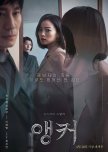
Haunting psychothriller. Rather psycho-logical. Intense acting of a fantastic trio.
"Anchor" is a psychological thriller set in the competitive world of TV news anchor. A nightmare on the edge of a horror trip begins, as Jung Se-ra receives a strange phone call, followed by fatality. Se-ra sets out to investigate herself... Eventually a psychiatrist plays a dubious role, starting to increasingly influence Se-ra´s world. Her manipulative controlling mother on the other hand cannot tolerate this. Increasingly, realities become blurred. What Se-ra finds out in the end is downright shocking.Like I said, this is a psychological thriller. On top of that, it gets mysterious, psychologically complex and a bit uncanny at times. Viewers see the world through the eyes of Jung Se-ra (impressive: Chun Woo-hee), who is getting confronted with her own blind spots. Tugging on one side is her dominant mother (spooky: Lee Hye-young), while on the other side the provocative psychiatrist In-ho (unfathomable: Shin Ha-Kyun) plays with fire confronting Se-ra's psyche with hypnosis.
"Anchor" clearly thrives on the intense acting of this fantastic trio. Haunting.
PS:
Don´t expect to get all the answers straight - the KMovie is rather psycho-logical.
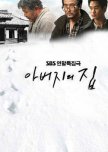
What an outstanding chamber play with two extremely gifted, stellar actors
Father's House" has two episodes only.What an outstanding chamber play, though!
With two extremely gifted, stellar actors. Choi Min-soo, already living acting legend at that time, and Kim So-hyun, then just in the starting blocks for fame. Choi Min-soo and Kim So-hyun deliver an unforgettably intense, mature performance and thus the authentically touching portrait of a dear, profound, yet often clumsy father-son relationship over a period of more than 2 centuries.
Male feelings are the focus. The heroes in "Father's House" are men of simple, humble origin - with either a gruff, rough and rumbling or withdrawn demeanor of hidden feelings that are rather reluctant and probably seldom felt, let alone shown. However, having feelings and showing emotions is allowed in this KDrama. It's difficult to deal with, yes, but it's possible. Necessary even.
Emotional sincerity has a liberating effect. The three male protagonists - son, father (and his adopted father) - actually become role models. "Father's House" came as a distinct year-end television show at the turn of the year 2009 - with reruns after that...
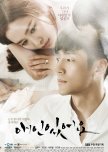
Touching, moving, stirring, rousing, exciting: Makjang, yes. And Rom+/-Com. And more. Fabulous.
Truths just want to come out. Thus, sometimes they find quite miraculous ways."I Have a Lover" features Makjang. However, the KDrama also and above all offers an unusual love story over 50 episodes.
It also tells about the creeping drama of marriage after the 'point of no return', when secrets and/or feelings of guilt, disappointment and reproaches have long barricaded the couple's way to each other and marriage has become a stale shell or facade, with hardly any space for dear affection left. Eventually, with all those hidden emotions it becomes increasingly difficult to lovingly respond to each other. At last, it may seem impossible to pave a new way towards renewed trust, closeness and genuine intimacy.
Moreover, "I Have a Lover" tells about the trauma that couples as parents suffer from the loss of their child. This KDrama is about painful emotions not being shared, getting in the way of a trusting, loving, intimate relationship. In the most desperate moments the one you need the most seems the furthest away. Missing a comforting connection makes it even worse. Finally, the insincerity leads towards sadness, anger or even indifference and detachment regarding the hollow relationship.
Drawing human characters with their shadows and radiance, the KDrama tells of the whole range of emotions people have and share in intimate relationships. "I Have a Lover" portrays an extraordinary character development process. Will the couple thus be able to reconnect?
The side plots add to the sophisticatedly composed symphony of complex, conflicting emotional worlds. It's about pain and hope, disappointment and forgiveness, sincere love and betrayal, above all about romantic love, but beyond that about love in all possible facets. Family in its ambivalence as bonding and bondage, as an ambiguous place of trust and obligation, forms a creeping leitmotif that holds all the narrative strings together.
The scenarios effortlessly switch between different living environments. The focus is also on lawyers - those 'footmen' serving the elite big corporations and those 'upright' serving the little folks.
At first, I wasn't sure if I wanted to follow an exhausting relationship between estranged spouses for 50 episodes. But it quickly became apparent that the story and its two perfectly harmonizing leads invite you to depart on a wonderfully refined emotional trek through the human emotional worlds.
"I Have a Lover" is touching, moving, stirring, rousing, exciting. It is Makjang, yes. It is Rom+/-Com, and more. Fabulous.
Ps:
The KDrama (despite the 50 episodes) suits for a rewatch, as many aspects and details might then become even more meaningful...

Dynamic with high intensity caused by a sheer impossible tension between self-control & surrender
Revenge and KDrama obviously go extremely well together. TV productions are full of it. Actually, the revenge-motiv appears to be eternally young, being grippingly re-staged over and over again. "Eve" from the year 2022 is one of them - idiosyncratic, with an unmistakable coat of paint. "Eve" is about a long-planned vendetta against one of the most powerful Jaebeol clans in the land. "Eve" may join a long list of KDramas in the revenge genre. However, this KDrama scores with its very own charismatic aura.Premise of the revenge-plan against the most powerful: Perfection should be brought down by perfection.
Maximum control should be conquered by maximum control.
If one wants to control life to perfection, what remains is a lifeless, loveless shell. The price of power is transcending one's humanity. The little Jaebeol preschool daughter vividly fights the emotional price of power: she's already learning to play golf, but she's still peeing her pants - she´s overstrained ... Living the Win are her parents and grandparents: feeling and behaving like deities... The perfection of arrogance finds its direct expression in the control, the unscrupulous abuse and the brutal oppression of others. It goes hand in hand with self-control. Yet, the extent of the staging of their 'beauty' and ´perfection´ becomes downright repulsive and turns 'beauty' into its opposite - disgust.
The (dramaturgically chosen) valve grounding the human being in his earthly transient body is the dance. Here especially the tango. Exotic, erotic, heavy, deep, dark. The dance, the rhythm and the music bring you back into your own body. You have to listen to it - in tango to the body of the partner, too. So it's also about perfection here, but it consists of perfectly balancing your own body movements with personal authenticity, feelings and perception. THIS ´perfection´ draws from itself and is not at the expense of others. It culminates in a state of relinquishment of control - an altered state of consciousness. This condition only lasts for the moment of the dance, for the moment of encounter. (The Andalusian flamenco even coined its own term for bringing the dance to perfection: 'Duende'. This concept stands for an almost ecstatic state of consciousness that results from surrendering to the interplay of different brain areas, physical dance technique and emotion.) This moment makes you feel alive - intense, true, pure and innocent.
Throughout the individual episodes the revenge-hungry protagonist (a fantastic So Yae-ji) maintains an extremely high tension between the poles of maximum possible emotional self-control (in the service of the elaborate revenge plan) on the one hand and complete surrender to the sensual, invigorating movements of tango dance on the other. As the dance draws its power and charisma from the depth of the subjective, authentic emotional world, maintaining this tension is almost impossible. In fact the KDrama thrives on this very special dynamic (of the sheer impossible bearing of the tension between self-control and surrender). The result is a consistently high and gripping intensity.
I have read some reviews that accuse this KDrama of the (missing) chemistry of the protagonists or the ending or the resolution of the revenge motive, or even the revenge motive at all. Well, that is of course a matter of taste, too. In any case, I think the motive for revenge suits South Korean authoritarian society. Even today. I also consider the character of Kang Yoon Gyeom being drawn (and acted) extremely well - if the protagonist were sympathetic, open, tangible (and, if you like, more classically attractive), then the relationship dynamics would be more predictable. His repulsive, calculating side suits him. The fact that he is 40 already plus he doesn't really fit the image of classic male love interest suits the role, too. So do those very subtle nuances that reveal his other (touchable, needy) side. He is not extremely likeable. I agree. Yet, thus the provoking relationship with him subtly, unintentionally and unexpectedly develops its own dynamic. The ambivalence - attractive vs. repulsive - comes across quite well in my opinion. A strange chemical mixture, an unknown factor in the revenge plan equation. The reactions triggered by this in turn leads to an ending, that is what it is. ... Either way, revenge NEVER makes you really 'satisfied'. Because the pain of the old wounds or the memory never goes away, and the loss cannot be reversed either. On the other hand, with revenge new karma comes along and is guaranteed to be saddled on top of everything else, which one has to spoon up ... (This is usually overlooked when one sets out to take revenge...)
From my perspective, "Eve" is a haunting KDrama - with a lasting impression for sure.
It might also be worth mentioning:
The staging of the cruelty within the Elite world, their madness as well as the space given for the sexual dimension of the relationship are exceptional for a KDrama. However, these deliberately staged rather animalistic or even archaic aspects of the human species (which are assigned to the evolutionarily older brainstem or reptilian brain) set a sharp contrast to the hypocritical, superhuman self-portrayal of the Jaebeol elite...
---------------------- SIDE NOTE: --- Revenge motive and KDrama - for once wanting to control the elite 'authorities' who otherwise control the rest of the country ---
South Korea (with its comparably recent dictatorship history) is probably one of the places on earth where (perhaps a little bit more than in many other places where rule of law has already gained a somewhat more solid footing) rules still mainly apply to 'simple' people, the masses. The influential Elite, the Jaebeol in particular, namely play their private, own, elitist game. They are isolated from the rest of society. They seem to own the world. They live and rule as they please in their own orbit. When their world collides with the masses, it's annoying, but rarely turns out bad for them. They simply get rid of disruptive factors (or better: let others get rid of them). They enjoy all the freedoms. For them, ordinary people are actually of no worth. They can be substituted. They can be controlled by money or violence.
The state should actually be responsible for objective justice. But 'state' is made up of people. And the less binding the objective rules are handled by these people or the more rules can be bent, stretched and interpreted in favor of the 'perpetrators' from elite circles, the greater the subjective dissatisfaction and the stronger the desire of the 'victims' for vigilantism - the desire for revenge!
However, there is a difference between the desire for revenge/subjective justice and the realistic possibility of actually getting it. For the influential powerful, a few phone calls may suffice. The common people have to be a bit more subtle and sophisticated. Vigilante justice needs to be well planned. Especially if you want revenge on a person from the orbit of the Jaebeol. It costs time and money to be able to penetrate their world at all. In most cases, sworn helpers are also necessary. After all, it is to be expected that the same applies here: a plan is there to be discarded... Not everything can be foreseen. Details have to be improvised. The space for the unexpected can only be calculated with a degree of blurriness.
Against the background of authoritarian South Korean social structure, KDrama and revenge motif often and happily enter into a dramaturgically promising connection. It offers a vicarious valve for the emotions of the many ´victims´ of a corrupt system...
---------------------------------------
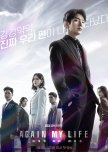
A bit of magical impetus needed to effectively counter autocratic networking and corruption
"Again my Life" is about a personal revenge campaign and at the same time a fight for the rule of law. David is once again up against Goliath. In his first life, the young prosecutor fails - and dies. But miraculously he gets a second chance. Eventually, in this second attempt he sophisticatedly works on a supportive network. ´David´ no longer fights alone."Again My Life" is part of a kind of law-and-order series invasion that swept over the KDrama world in 2022. The country seems to be crying out for justice. There is obviously a growing urge for real justice and effective punishment for the backroom masterminds, who are holding the true strings of power. A yearning for an end to eternal corruption. At the same time, there is great frustration that it seems so extremely difficult, almost impossible, to truly say goodbye to the old autocratic structures. There are laws, but they still don't seem to equally apply to everyone. For some time already, KDrama creatives (and their sources like webtoons etc.) have been fervently exploring the possibilities for a new horizon. In 2022, however, we see an unprecedented abundance, almost a climax, on a desperate path of effectively and/or morally defying the machinations of the powerful and the injustices and loopholes within the practiced legal/societal system. E. g. "Military Prosecutor Doberman", "Juvenile Justice", "Why Her", "Insider", "Doctor Lawyer", "Law Cafe", "The Empire", "May it Please the Court", "One Dollar Layer" and even "Extraordinary Attorney Woo" mercilessly bombard the audience with the same basic structural problems over and over again. In doing so, in their own individual way they juggle with the possibilities, opportunities and limitations that the legal system and the rule of law have to offer. And so does "Again my Life".
"Again my Life" is one of those productions that, bottom-line, choose a rather sobering, almost pessimistic perspective. A pessimistic tone might come from the fact that the protagonist actually needs a magical impetus to even get a minimum chance to clean up the ailing, corrupt and mendacious system: with a second life. Time is practically turned back and he gets the opportunity to live once more - to make it better with the advantage of his knowledge about connections and context.
Pessimistic might also be the fact that in the end the outlook is a questionable one. The audience may be satisfied in many respects, yet the basic problem can´t be thoroughly resolved - which I would think is pretty close to reality. The audience is mercilessly confronted with the question: is real democracy an illusion? Is democracy just a modern marketing gimmick that secretly hides the old concept of autocracy that has been tried and tested on the peninsula for centuries? A new, beautified skin for the old wine?
Is the message therefore a pessimistic one? Almost, but then no. Because even if it feels (and really) requires rather superhuman efforts (or circumstances) to counter the old autocratic domination effectively, it can individually still succeed. The evil resides in each individual human being - in our seductibility and venality. Everyone has to face that. Again and again. It's not something that's rooted in the system, but in people. People fill community with life. Everyone contributes to it. This is partake and participation. However, this is only possible with mature, responsible, self-responsible, upright citizens who cannot be bought - and thus degraded to bowed lackeys.
Autocrats (= powerful private individuals within the given democratic framework conditions) need appropriate lackeys who give them power by supporting them in undermining the existing legal system. Therefore: what may come across as a pessimistic message at second glance turns out to be a rousing warning finger: Be vigilant! Stay alert! Do not give up! Take your chance, every day! Prove to yourself that you are a sincere citizen: Self-determined. Independent. Responsible. This is the only way, democracy and the rule of law can actually work. Otherwise, we agree with those self-proclaimed autocrats - and then we don't have a right to grumble and complain... Against this background, "Again my Life" offers a compelling, exciting story and at the same time a vivid lesson in 'responsible citizens versus corrupt lackeys'.
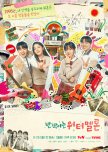
"Twinkling Watermelon" radiates warmth and knows how to touch. Cheers to life. (And to magic, too.)
What a nice surprise in 2023!Full of heart and love for music, too. Though neither major, nor minor, but plenty of both. Fresh, cheeky, cheerfully playful and yet with complex substance. RomCom inclusive. “Twinkling Watermelon” follows the trend of 2023 productions: time travel. A journey into the past, into the parents' late youth - as a gift that offers the chance to understand a little more about them and thus at best make peace with life here and there. Charming magic is also involved, as life is full of surprises if you just open and follow your heart... that's the wonderful motto that offers balm for troubled souls. Viva la Vida!
In fact, the story's ostensibly cheerful melody is supported by an emotionally serious basso continuo. This gives this KDrama a warm, complex, lasting depth, despite all its youthful playfulness. The protagonist is a hearing child of deaf parents (CODA). He is an extremely talented, eager, responsible, loving son and brother, but he is inevitably somewhat overwhelmed by his responsibilities (as a child), out of guilt loading even more responsibility on his shoulders. He feels lonely at times with his experiences of the acoustic world that he cannot share with his parents. And he also suffers from the social marginalization that he and his family experience.
Eun-gyeol (for all his positive approach to the challenges of his life) embodies the psychological conflicts of any CODA, that he, too, has to deal with by living between the worlds (with and without acoustics). He does it quite well, yet deep down he understandably suffers from the great responsibility he has to bear as a child already. Sooner or later he has to come to terms with this conflict in a self-loving and self-confident manner, so that he may allow himself to go his own way in life, too, despite the challenge. Basically, it is precisely this inner psychological dynamic that is the dramaturgical driving force of the story.
It is not uncommon for CODAs to seek professional support or ask for help, if the emotional burden feels too heavy. (Just like anybody else would as long as they acknowledge.) Here the support comes unexpectedly in the form of a magical journey through time, and there is help, too. But significantly, Eun-gyeol got so caught up in his trained behavior pattern that he (almost obsessively) only sees the time travel as another challenge to prove himself and being in charge - no matter what the cost. It is almost verging on megalomania to believe that he might now be responsible for the fate of his parents in their past, too. (However, throughout the series this aspect opens up room for fun and comedy.) On the other hand, the immense inner psychological pressure that he puts on himself also subtly reflects the sad dilemma that keeps him trapped. (Which in turn latently contributes to the emotional depth of the KDrama.)
In fact, “Twinkling Watermelon” opens up space for even more serious topics in different storylines. Aside from the social stumbling blocks in the lives of deaf people, there are child abuse and suicidal tendency, too. Thus, overall, there are pretty profound themes that the KDrama tackles bravely and plays through with a lot of feeling, yet still in a digestible manner - despite all the seriousness, embedded in colorful joy of life. "Twinkling Watermelon" radiates warmth and knows how to touch. Cheers to life. (And to magic, too, that can re-shuffle the cards of time and space... who knows?)
PS:
Would have, could have... if only the sign language hadn't been processed acoustically... but authentic silence was probably too daring... and would probably have neutralized the lively esprit of the music band's approach towards life... hmm... everything altogether probably doesn't work...
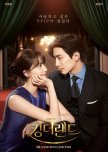
Maybe being so focused on success, King-The-Land almost lost track of the core of a KDrama´s heart
As far as I am concerned, "King the Land" triggers extremely ambivalent feelings. I'm still undecided whether to classify this KDrama as a Trojan horse or as a successful prototype AI product. In other words: is it deliberately engineered brainwashing (that at times comes very close to even insulting the human intellect), or is it the result of an AI (programmed for max audience share) as showrunner in its first, but surprisingly successful test run?"King the Land" is a Rom+Com. A fairy tale we have known and loved for generations. The unthinkable becomes possible: the hard-working girl next door finds Knight in Shining Armor - a Jaebeol offspring who can afford the luxury of not even being interested in the rich heritage of the conglomerate. Well, if you feel like something like that, you get a highly polished version of a cheerful, trivial (and conservative) love story that opens up clichéd insights into the upper segment of the shamelessly high-end luxury world.
Here my criticism. My irritation. Even annoyances.
--> These days, we can (and obviously have to) get used to product placement. That´s nothing new. However, "King the Land" undauntedly puts an almost obscene shovel on top of that. It goes so far that at times I felt like I was stranded in a 16-episode commercial, which I consider quite intrusive. Shameless. Apparently it can always be worse.
I rarely fast forward. But rarely have I fast-forwarded as much as in "King the Land". Usually, I'm ready to get involved in moments - looks, gestures, stand still, in my opinion all of that can be part of the dramaturgy. But here the long takes far too often serve a product placement or a Lifestyle-Statement being deliberately staged on the occasion, or some triviality that may or may not be considered nice, yet without any impact for the story. Just for fun, so to speak, because it is (supposedly?) so pretty. Most of the time it's about a haunting, almost mean display of a lifestyle in the highest-priced luxury segment, which will probably never play a role for the vast majority of the audience. Then I get angry. Not because the story is set in an exclusive social class, but because it is staged in such an oversized manner, while giving it a lot more screentime than would be necessary or coherent for the feeling and understanding of the story.
My understanding goes like this: The high-gloss, stylized luxury lifestyle of the absolutist elite hides a message between the lines that is addressed to all classes below: “”” You'll never get there! Forget it. Enjoy what you have. Make an effort, then it could even be a little more. Yet, be aware: WE play in another galaxy, light years away from you. Give up. Surrender. Let us do it all. Then it shall not be to your harm.”””
---> Additionally: The KDrama chooses a nasty mixture of proven dramaturgical elements and links them with another hidden, questionable message that might be hardly noticeable, yet effective.
There is the world of the employed, that so many people in the country (and elsewhere in other countries) share. In particular in South Korea this is often enough about an authoritarian hierarchy within a corporate structure. This includes almost as a matter of course: bossing around, exploiting, abusing, and some more exploiting. This goes through all instances. It is nothing new. This is everyday life for many.
Thus, a rebellious protest is always welcome in KDrama. “King the Land” also grabs into this box - courageously and with some humor as the hero immediately counters the frustration that nothing ever changes. He rebels. Dares to speak back. Pushes through, with vigorous means when necessary. And keeps the upper hand. How wonderful! … It's just too bad that he happens to be the chairman's son and can afford to do that... Here, and there, and almost everywhere...
So, the positive, rebellious (democratically inspired?) message turns into the (autocratic) opposite: “””Only those who swing the scepter of (monetary) power can change something, because they are the ones, who actually have something to say. The ones at the top. An this is, because they are at the top for a good reason, because they have the background, the stamina and the right genes to de facto be responsible for the rest.”””
“King the Land” never tires of throwing this message into the audience's eyes and ears - in all its possible epic breadth. In particular, embodied by the protagonist's stepsister and antagonist, but even by the protagonist's trusted secretary. Sure, our hero ticks differently, but (this is the harmless insight to take home with us): “””It's not the evil chairmen, but there is an economic reality with which all people who think and act halfway responsibly have to put up with. Period! These are given contexts that one cannot escape from when in such a responsible position. Ergo: THOSE up there are no worse than we down here. On the contrary: THOSE up there bear responsibility, we down there don't. And THOSE up there actually mean well with us. We can actually be happy: we are doing well after all...”””
Yes, it may be true, that many are better off than others, that they lead a more comfortable life than their parents or grandparents did. Nevertheless, I feel this message (that so often resonates in this KDrama) as one that basically wants to keep people little and hold their potential down. I personally don't like that.
Therefore: Is “King the Land” trotting along as a Trojan horse of the autocratic backroom masterminds, selling their notion for a modern absolutistic society?
Or - with a wink:-) - another assumption: Is "King the Land" an AI product? An AI, which with all its algorithms, its heuristic search for solutions and its logical conclusions, yet blind for socio-political nuances, reaches into the colorful pot of success guaranteed dramaturgical determinants, inflates those for even more success and breathes life into it with popular (success-guaranteeing?) mimes, music and light. However, one can sometimes get the impression that the heartbeat is missing. Its rather forced here and there. (Some even reproach the KDrama for lacking any cross-cultural sensitivity.)
In my opinion, the 'done with love' of this KDrama bobs back and forth between 'yes' and 'no'. A pretty face has to be enough, a harmonious tune, a touching gesture, a look, a kiss at the right time to make amends for the rest. Towards the end, the KDrama tries hard again, the amorous and yet tricky relationship dynamic emotionally comes to the fore a little more (e.g. as a relationship that isn't appropriate for the Heir), and some processes come across quite promising, to the extent that maybe something actually might possibly change about the cemented corporate culture of King Group. Nevertheless, being embedded within the absolutist brainwashing of the overall scenario, it loses some of its charm. (For me) A bland taste remains.
--> However, the good news at last:
I cannot say I totally wasted my time. If in between I was able to ignore all of the above-mentioned allegation (which was actually possible!), then the KDrama also delivered: a nice, clichéd love story in the Jaebeol milieu, with some cat-and-mouse games, without much depth, but with extra (!) cream. Simple as that. (By the way, some are already treating "King the Land" as the KDrama with the best kissing scene...)
--> Conclusion:
Maybe being so focused on success , “King of the Land” almost lost track of the core of a KDrama´s heart. However, at least a few within the production team obviously tried to put quite some effort into emotional finetuning, too.
So, I'm ambivalent. In spite even the unabashed style I criticized, I watched to the end. Not only out of professional curiosity. Despite all the indignation that inevitably spread through me again and again, at times I eventually enjoyed it, too. (Otherwise I would have dropped it - and then quite early.)
For all that, that's KDrama, too...
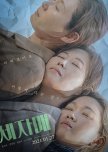
An all round ambitious work. (However, 'beautiful' is different...)
"Three Sisters" has won numerous international awards. 12 to be precise. But I'll say it right away: it's overall rather painful to look at. It's even painful to the point. Again and again. So true-to-life that it even hurts some more. Some might seem crass being focused that intensely. But at the same time it's not that crass, actually. It is the normality shining through behind the story, that is almost the most painful part of this KMovie.Three sisters, each in their unique way coping and trying to live with the pain that forces their souls into a corset from which they don't know how to free themselves. They live with their trauma. Are alone, captured within their traumatic past. They don't talk about their trauma. They are emotionally rather surviving than actually feeling alive. They are still trapped in their unresolved past today, because they don't recognize or acknowledge the corset as such. But as long as that doesn't happen, they can't put it off and thus learn to approach life, experience life without a corset...
Haunting portraits of women! So intense that the pain reaches the audience, as vicarious emotion so to speak. Fantastic actresses. An excellent KMovie in all aspects... lighting, scene, shot, cut, etc. too... An all round ambitious work. (However, 'beautiful' is different...) About a topic that is one worldwide. About a topic that is also a big one in South Korea with such a strong patriarchic family hierarchy. A trauma that far too many people on this earth learn to endure. Have to cope with one way or another. Suffer from for the rest of their lives. Being ashamed of it. Yet, actually rather being ashamed of themselves. Because they can't explain the incomprehensible in any other way. Thus they remain trapped in the ineffable.
No movie for every mood.
Yet, when the time is right, then definitely worth it.
------------------------------------------
Spoiler alert:
Here the unspeakable is spoken out at last. There is an unexpected showdown that has it all. Something that is liberating. Yes, it hurts, again – just like cold fingers starting to feel the warmth… True enough, healing is a process. (Life hardly becomes smooth&easy overnight.)
Acknowledging the corset. That is the first step. Feeling it, joggling it. This is the next step. Then get on the trail of your own feelings. Find some expression for it. Surrender to your vita and what you sur-vived so far. Let go of the corset, by now being grown and old enough to stand by your side. Grab your inner child´s hand and allow yourself to be who you are, embracing the feelings you have. All of them. The anger, helplessness and desperation, too. Be proud of who you are. Daring, step ahead. Longing to be. Being free to be. Being palpable. Being. Sharing. Communicating... giving life a second chance...
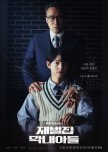
A snappy series, definitely worth watching.
"Reborn Rich" brings a breath of fresh air to the Jaebeol milieu. The story plays with "time and space" and at the same time deals with a highly topical inssue of the time: the meanwhile flattening turbodynamics of economic developments, which as a result of the Asian crisis positioned South Korea as a pioneer of the digitization age at the top of the world. The story comes at a time when the first melancholic fatigue is spreading in the country. It is fascinating how the creative industries at this point in time cheerfully holds up a positive, optimistic, innovative blueprint (i.e. the web novel “Youngest Son in the House of Jaebeol” was followed by the film adaptation as a series).The country's audience ratings went straight through the roof. After half the episodes they had already tripled and there was no holding back. The story hits the mark. The rights have also been generously released on international streaming platforms. The story about far-sighted, intelligent, courageous, ambitious and at the same time ruthless entrepreneurship draws wide circles and inspires worldwide. There is a lot of optimistic esprit in it, all about a spirit of growth that is actually predicted to be in danger of dying out in the form we are familiar with. In any case, lively ideas for innovation and intrepid capitalists rock the show in "Reborn Rich". Brilliant dramaturgical move: the patriarch of the very first hours of the Jaebeol meets with the young, new, digital zeitgeist. Charming. Tough. Mischievous. And in their mutual intention to increase profits far-sightedly, grandson and grandfather are one. The recipe works: relaunch and remake of the Jaebeol heroes from the very beginning. That gives hope and a good mood. Just in time.
In fact, the government actively decrees and supports innovations, subsidizes technical subjects at universities with large sums of money, cuts humanities institutes and puts 'all in' on the growth sectors. However, even though two-thirds of young people have a university education, 12.5 percent of the employable age group up to the age of 29 cannot find a job in the early 2020s. The last time the figures were so sobering was during the Asian crisis. And: society is aging. Although the gross domestic product is currently (in early 2020s) still growing, at almost 3% per year, it is far removed from the dizzying dynamics of the post-Asian crisis years and their GDP figures, which were three times higher.
South Korea's conglomerate founders still have hero status. But the proven system is exhausted. The following Jaebeol generations make life difficult for each other with inheritance disputes and live out their practically ennobled status with self-love. They have long since lost sight of promising, visionary growth, social responsibility and national well-being. New promising impulses are needed. "Reborn Rich" finds a successful form of expression for this difficult national emotional mixture.
Born into the Jaebeol Dynasty, the youngest grandson of the Soonjang Group's founder is not a spoiled Jaebeol, but an intelligent, hard-working, creative-thinking, adaptable young man who originally (before his sudden rebirth) was employed in 2022 as a CEO assistant in the service of the Soonyang Jaebeol (actually as a Senior Finance Manager) - he was not only quite smart and busy but got harassed a lot too. The founder of the company and now (in his second life) his grandfather was actually a role model for him. The ´grandson´ thus already knows his biography almost by heart. Reborn again under the Jaebeol sky he becomes a clever lawyer and investor who can hold a candle to his 'grandfather' at eye level.
(Admittedly, there is somehow also a bit of cheating, because the youngest grandson distinguishes himself with his considerable entrepreneurial genius based on knowledge from the future, which gives him not inconsiderable advantages in competition with the rest of the Jaebeol clan...)
Nevertheless, the ambitious fake Jaebeol grandson would be one that the country needs today. Socially responsible. Grounded. Visionary. Brave. WITHOUT (!) the filth of the otherwise mostly elitist Jaebeol offspring. Instead, WITH the fearless, highly motivated and visionary esprit and good/lucky timing of the first Jaebeol, who brought prosperity and prestige to the country in the people's narrative.
The issues, challenges and problems facing the Soonyang Group mirror an entertaining historical outline of South Korea's turbo-dynamic development phase, which led the country into the highly digitized consumer paradise of the last almost 2 decades. On top of that, Justitia may also take some space in her difficult fight against corrupt networks.
In "Reborn Rich" old energy meets the current moral of the times and, practically in a combative spirit of sport, struggles about the constructive economic attitude for new, forward-looking impulses. "Reborn Rich" promises plenty of fun, sanity and series enjoyment against a serious background. The poignantly portrayed grandpa-grandson dynamic is also brilliantly cast with Song Joong-ki and Lee Sung-min.
A snappy series, definitely worth watching.
-----------------------------------------
SIDE NOTE: --- Background: Asian crisis in the 1990s and the IMF in South Korea ---
The Asian crisis of the 1990s brought South Korea to the brink of national bankruptcy. Banks, as well as large and small companies had to file for bankruptcy, many people lost their jobs, their assets and their prospects.
In South Korea, however, there is significant talk of the IMF crisis. That's because people saw the tough conditions imposed by the International Monetary Fund (IMF), which amounted to massive interventions in the country's existing structures, almost as colonialist attacks - like the Japanese did back then. In fact, the IMF provided South Korea with the largest loan to date ($57 billion) to save the country from ruin. At the same time, the people, motivated collectively by patriotism, made unique sacrifices that went as far as selling their own gold in the service of national gain and the consistently disciplined renunciation of export articles. The combination of financial help from outside, internal discipline and willingness to make sacrifices as well as targeted economic restructuring measures maneuvered South Korea out of the recession at amazing speed and torpedoed the country into the unimagined prosperity (on credit card basis) of a first-class digitalized consumer society. The country is still living from this today, but the air is slowly getting out...
-----------------------------------------
PS:
Never mind the ending...
it could be this
or that
or something else,
here it is this...
quite mind blowing...
whatever...
the circle is round after all...
and the journey is the reward, isn´t it...
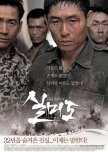
Secret SK military unit, drilled solely for assassinating Kim Il-sung, becoming victims of politics
“Silmido” is a KMovie that generated enormous public impact in South Korea. A 2003 production that used dramaturgical means to bring a previously unknown, small but rather blatant chapter of South Korean history to public awareness, that had long been kept secret and filed away. The KMovie “Silmido” had its mission fulfilled – at the box office, among the people and among those, who ultimately make decisions.“Silmido” was apparently more popular in South Korea than the Lord of the Rings trilogy or Titanic. To this day, the KMovie in South Korea is considered one of the most successful productions ever. The cast is first class. The focus is on the training camp for the secret military special unit 684 - its soldiers, its commanders, the training and living conditions. In the end we see where this all is leading to – this at that time particularly fatal involvement of the military with domestic and foreign policy, plus and foremost always at the forefront, yet hidden behind the curtain: the secret service.
The story is contrasting ambivalent attitudes towards feelings of national solidarity. On the one hand, an emotional patriotism based on the connection to one's personal origins and South Korean homeland, and on the other hand, a politically instilled national identity of “democratic South” against “communist enemy in the North”. On top of that: Unconditional obedience within the chain of command struggling with common sense...
Overall, it's about a brutal man´s military world. It is about hardline drilling methods. Yet , it is not about heroes and villains, nor about the good guys against the bad guys. Over time, the protagonists are increasingly gaining a profile, that shows some softer heartbeat, too. Camaraderie, bromance and respect for each other are in it as well. The showdown is rather disturbing.
PS:
Eventually the KMovie had its impact: in 2010, the central district court in Seoul ordered that the equivalent of around 188,000 euros in compensation should be paid out to the families of the former members of Unit 684 - the forgotten, denied unit that “Silmido” is about. The court comes to the conclusion after following public pressure and thus officially investigating the case: The Silmido soldiers had not been sufficiently informed about the hardship and dangers of the training camp, the training conditions had violated their basic human rights and the government at the time (1971) would have brought great suffering to the families of the bereaved by covering up the events.
---------------------------------------------------------
SIDE NOTE: --- Secret special Unit 684 ---
The film title "Silmido" refers to a very small, actually uninhabited island in the Yellow Sea, southwest of Incheon. Here (in response to the failed North Korean assassination attempt on South Korean President Park Chung-hee in 1968), between 1968 and 1971 a special military unit was trained at the instigation of the secret service, with just one goal: to eventually efficiently assassinate North Korean President Kim Il-sung. The circumstances surrounding Unit 684 are still not all clear. One thing is certain, though: the unit was created in April 68 (68-4) and trained in the utmost secrecy on the island of Silmido under almost inhumane conditions.
For the script quite some extensive research was done in advance. The story is based on rather thin officially existing information, added up with a few eyewitness reports, whereas gaps were filled with poetic freedom. For example, it is not clear how Unit 684 was actually recruited. However, among the specially trained elite soldiers there were obviously some with previous convictions, although not serious criminals. The KMovie ultimately decided to freely use a narrative that all the men were doomed criminals who, in their desperation without hope for an alternative future, had seized the last straw of becoming members of this particular secret unit.
The three years of elite training on Silmido had been extremely tough. Those who were not suitable simply did not survive the highly demanding torment. However, when the 31 soldiers were ready for deployment, the government decided to refrain from carrying out an assassination attempt and instead rely on a political solution for peaceful coexistence with the North. What had happened? US President Jimmy Carter hoped for a peaceful agreement. The South Korean policy followed that agenda, too. Accordingly, the head of the secret service was replaced by someone who also supported this peaceful approach. The link that was supposed to open a new dialogue between North and South was the Red Cross, not the military...
What may sound respectable, however, consequently led to the immediate disbandment of Unit 684. As of now, it officially should have never existed. Thus, 31 elite soldiers lost their right to exist. Their meaning and only goal for which they had lived (or rather survived) for the last 3 years, was trampled on... They were no longer useful, on the contrary: a disruptive factor. But politicians had made the calculation without the fighting machines they had specially drilled... this all led to a showdown in the outskirts of Seoul. As its result, however, Unit 684 went incorrectly down in history as a group of heavily armed communists... until 2003.
From 2010 onwards, it became finally official that actually those men were a South Korean secret elite military unit that had been drilled solely for the planned assassination of Kim Il-sung – until plans had changed at short notice for political reasons and some man in suits had decided to wipe out the life of 31 (in this context innocent) men in uniforms without any trace...
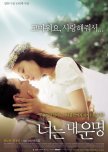
Magnificent balancing act of intense emotions. Old school production without high-gloss polish.
"You are my Sunshine" is the international title of this KMovie from 2005 - named after the US country song of the same name from the 1930s. However, the original title is "You are my destiny". Regardless, both are working. The Plot is based on a true story that happened in Yeosu around 2001.It's about prejudice. About the socially doubtful binding norm and where it is actually coming from. And it's about a man who, fortunately, cares less about what others say and trusts more in what he feels and believes is right. So this is about a positive role model of a man - a man who noticeably sets himself apart from the crowd who dominate the image of men here: Men who buy women, men who buy women abroad as wives, men who beat women without hesitation, men who infect women with AIDS (and don't tell them), men who won't let go of women, see them as possessions and unrestrainedly abuse them... There are the many completely 'normal', 'socially valued' men , husbands, fathers, whose behavior is simply outrageous. As if it were a matter of course, they set the standard of what is right, they set the tone... and yet deny any responsibility.
It's also about love. The sunny, courageous, positive message is embodied by a man who loves sincerely and unconditionally. However, he is generally considered naive. The cattle farmer is considered a hillbilly and a bit peculiar. Not just because he talks to his cow, but because he keeps the word he gave to the woman he loves and stands by what he feels. He is different. (Although, his attitude towards life, women, animals and nature could be considered quite progressive, too...)
And the woman? The female Protagonist could see herself as a victim. On top of that, she might be ashamed of her life. But despite everything that made her tainted and even 'leper' in her life as a prostitute, she was able to keep her soul pure inside. She is straight and clear, she doesn't deceive herself and above all she doesn't get her hopes up, because she knows life as it is - for women like her.
Life in the country is plain, ordinary, vulgar, simple. Also sensually grounded in the changing seasons. Although the ideal of pure, white skin is held high, the story instead focuses on the stigma of the tainted and tanned skin. The everyday scenario of bruises and violets from beating men as well as the darker Filipino and Vietnamese (versus light, pure South Korean) skin of purchased wives thematically dominate here. Finally, it´s about fear of AIDS (spots). That's the rural reality.
Nevertheless, there is this down-to-earth man who puts love above everything else – in good times and in bad... he´s honest, sincere, reliable, devoted, lovable. And there is this woman who can and wants to get involved... until her past catches up with her...
Two wonderful leading actors. Pure KMovie. Intense. Feels lifelike with a deep impact. A magnificent balancing act of conflicting emotions.
Old school production, though. Without high-gloss polish.
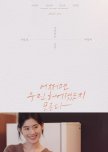
Powerful in its authentic acting & realism combined with dramaturgical abstinence
Does love have an expiry date? Or is it we humans who persistently fail to create a living co-creation from the promising 'WE' for which Cupid's arrow once set the course? "Maybe we Broke Up" doesn't have an answer to that. But! In impressive dramaturgical abstinence, the KMovie encourages us to think about it."Maybe we Broke Up" is also known as "Someone you loved". It documents in fantastic realism the unspectacular 'ending' of a relationship – like so many others. Almost as if couples in crisis could have applied to a reality show, whereas the camera team followed one of them through this difficult time and also for several months beyond. Everything seems real and lifelike and familiar. At the same time dramaturgically abstinent with neither comedy nor jokes through embarrassment, nor suspense, nor eroticism, nor violence, nor action being staged to get tempers boiling.
The couple's relationship story takes its inexorable course. And the problem with this relationship is that it has lost all its appeal. Habit, everyday familiarity, and being taken for granted have taken the place of tingling love. Concepts, expectations and relationship dynamics, which are now well trained from behavioural patterns, keep the radius of emotional highs and lows in check. The KMovie is consistent in this respect and doesn't try to sugarcoat anything. The camera just stays on and the viewers stay tuned to the action. We don't get emotionally involved, we just watch. Maybe we take a stand for one or the other. But that's our business.
The film doesn't want to push us into any corner. It just wants to take us along. Documenting. And it doesn't actually tell us anything new: A relationship gets more and more out of balance. Actually speaking out about the situation eventually brings it all down. There is no turning back. The 'WE' has become two individuals again, who now have to sweep up their emotional shards themselves and thus get the chance to learn the best from their mistakes.
The power of "Maybe we Broke Up" lies in the authentic acting combined with dramaturgical abstinence. The author is also the director. He stays true to his idea. There is no evaluation. And it is precisely through this simple authenticity that the realistic story spirals so poignantly into the mind, leaving the audience with their own record - their thoughts, emotions, questions and well-known stories, be it their own and/or those of friends and/or relatives.
--------------------------------------------------------------------------------------------
Side note: ---- Gosi Civil Service Exam in South Korea ----
The civil service career has been a priority in Korea for centuries. It stands for social recognition, but even more for financial security, up to retirement. Since the 14th century, candidates for civil service have had to pass a state examination. There are nine levels of officials. For the lowest ninth level, all you need today is a high school diploma. The competition is massive. The ninth "Geup" is for those, who get accepted, the start. With years of service and performance, or a degree, the civil servants can then advance to the middle civil service career. But for a higher career up from the fifth "Geup" you have to take the "Gosi" admission test, which only takes place once a year. It is quite demanding, but can be repeated indefinitely. Needing several attempts is not uncommon (and the high demands of the exam are always a popular topic, even in KDramas).
The Gosi exam is only the door opener. After that, the training takes place. A degree is also mandatory for the upper Geups, especially law, economics or political science. Since civil servants are/should be the pillars of society, only the most talented citizens are traditionally selected for this. In fact, most of the top five Geup officials hail from one of the three elite SKY universities (Seoul National University, Koryo University, and Yonsei University). An enormous market for tutoring institutes has now grown, not only for the university entrance exams, but also for the Gosi exam. In these, the candidates are intensively prepared. For many, this means nothing other than: study and study even harder, period. For one year. The better the preparation, the better the chances. However, you can get a lot of support for a lot of money.
The Gosi exam wants to separate the wheat from the chaff. For some, money may help, for others, iron will power, diligence and a certain amount of talent/intelligence must suffice. This combined with a supportive social environment, because in that preparatory year (and possibly subsequent preparatory years) there is hardly time for part-time jobs and everyday obligations...
--------------------------------------------------------------------------------------


 9
9 38
38 15
15















